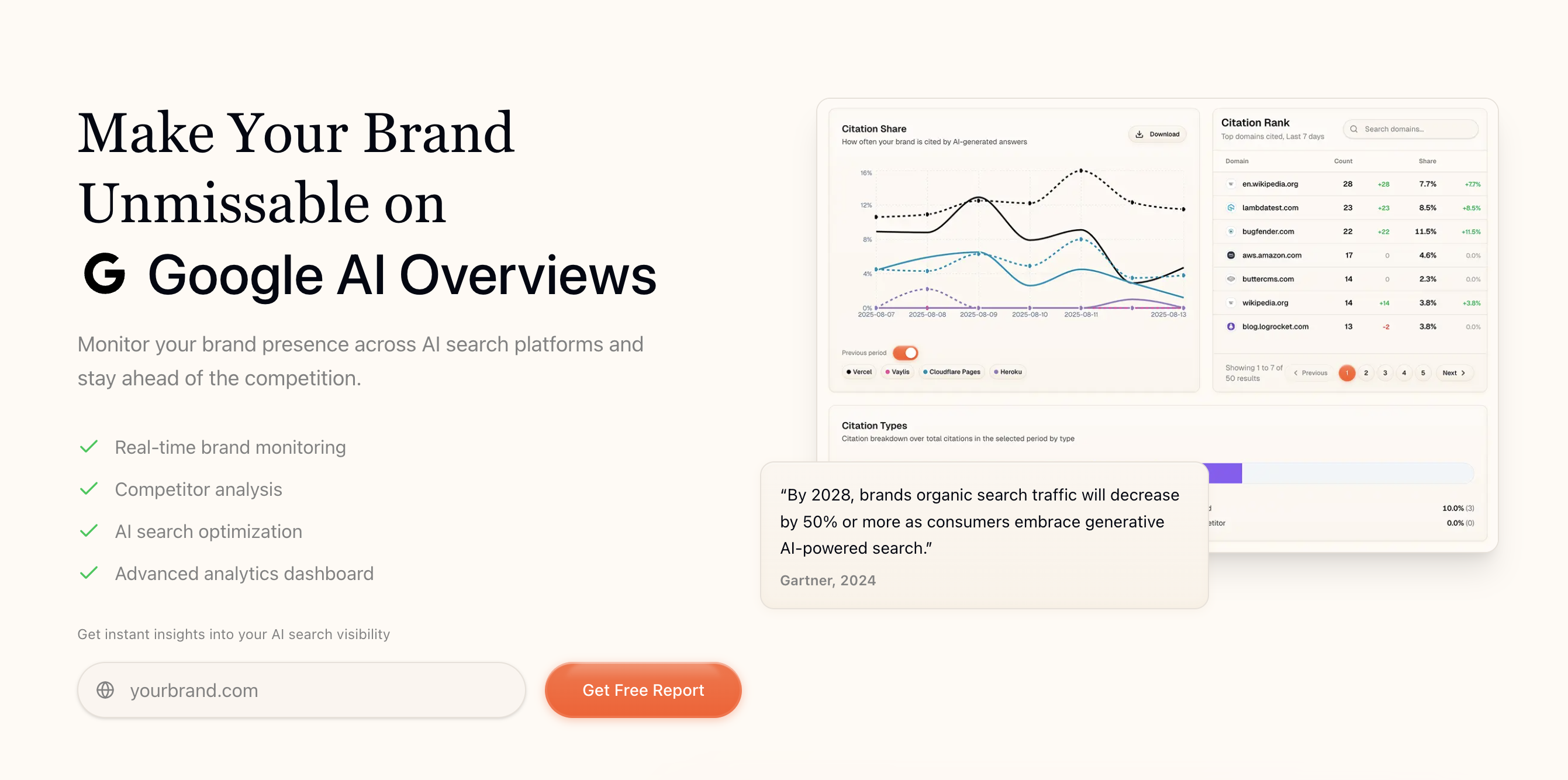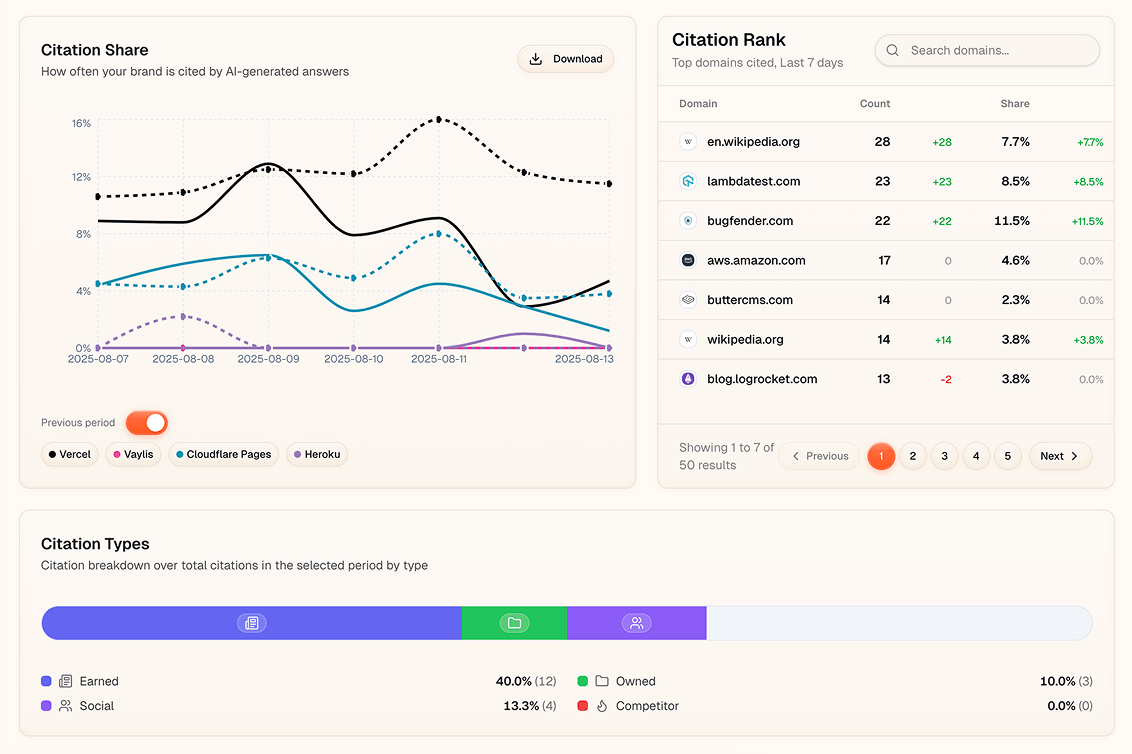The Death of Traditional SEO
Remember when SEO was about stuffing keywords into meta descriptions and building backlinks? Those days are gone. The search landscape has fundamentally changed, and clinging to traditional SEO tactics is like using a flip phone in the smartphone era.
AI-powered search engines are now the primary way users discover information. ChatGPT, Perplexity, Google's AI Overviews, and emerging players like Grok are transforming how people search. Instead of browsing through 10 blue links, users now ask conversational questions and receive direct answers.
Why Traditional SEO Failed
1. The SERP is Dead
Traditional SEO optimized for search engine results pages (SERPs) - those lists of 10 websites with titles, descriptions, and URLs. But AI search engines don't show SERPs. They generate answers directly.
Your carefully crafted title tag and meta description? Irrelevant. Your page's position in organic results? Meaningless. What matters now is whether your content becomes part of the AI's knowledge base and gets cited in responses.
2. Keywords Don't Work Anymore
Keyword research was the backbone of traditional SEO. Now, users ask natural questions like "What's the best restaurant in Berlin for authentic Italian food?" not "Italian restaurant Berlin."
AI search engines understand context, intent, and nuance. They don't match keywords - they understand meaning. Optimizing for specific keywords is like teaching your grandmother to program in assembly language.
3. Backlinks Are Losing Power
Backlinks were the currency of SEO authority. But AI engines prioritize fresh, authoritative content over link-building schemes. Quality citations from reputable sources matter more than quantity.
The Birth of AI Search Optimization
1. Citation-Based Visibility
In the AI era, success is measured by citations, not rankings. Your brand needs to be the authoritative source that AI engines reference when answering questions.
This means:
- Content Authority: Create comprehensive, accurate, and up-to-date content
- Brand Monitoring: Track how AI engines portray your brand
- Citation Analysis: Understand which sources influence AI responses
2. Multi-Engine Strategy
Gone are the days of Google-only optimization. Your brand needs presence across multiple AI platforms:
- ChatGPT: Microsoft's AI prioritizes web content and citations
- Perplexity: Focuses on real-time, factual information
- Google AI: Still values traditional SEO signals but adds AI context
- Claude/Grok: Emerging players with different data sources
3. Conversational Content
Content must be conversational and answer-focused. Users don't want blog posts - they want answers to questions.
This shift requires:
- Question-based content: Structure content around user questions
- Conversational tone: Write like you're speaking to a friend
- Comprehensive answers: Provide complete, authoritative responses
The New Success Metrics
1. AI Visibility Score
Instead of domain authority or search rankings, measure your AI visibility score - how often and positively your brand appears in AI-generated answers.
2. Citation Authority
Track which of your content pieces get cited most frequently by AI engines. Focus resources on expanding and updating these authoritative pieces.
3. Brand Sentiment in AI
Monitor whether AI engines portray your brand positively, neutrally, or negatively. Correct misinformation and amplify positive narratives.
Strategies for the AI Era
1. Build Citation Networks
Instead of building backlinks, build citation networks. Create content that other authoritative sites naturally want to reference.
2. Multi-Platform Content Distribution
Publish content where AI engines can find it: your website, industry publications, social media, and data platforms.
3. Real-Time Content Updates
AI engines value fresh information. Implement systems to keep your content current and accurate.
4. Brand Reputation Management
Actively manage your brand's narrative in AI responses. Monitor for misinformation and work to correct it.
The Tools You Need
Traditional SEO tools like Ahrefs and SEMrush are still useful, but you need new AI-specific tools:
- AI Visibility Platforms: Monitor your presence across AI search engines
- Citation Tracking Tools: See which content gets referenced
- Brand Monitoring Systems: Track sentiment and mentions
- Real-time Analytics: Monitor performance as AI algorithms change
The Future of Search
We're entering a new golden age of search. AI makes information more accessible, personalized, and useful than ever before. But success requires a fundamental shift in strategy.
Traditional SEO was about gaming algorithms. AI search optimization is about being genuinely helpful and authoritative.
The brands that thrive will be those that:
- Create exceptional content
- Build real authority
- Monitor their AI presence
- Adapt to changing algorithms
SEO isn't dead - it's evolving. The question is: will you evolve with it?
Frequently Asked Questions
How do I transition from traditional SEO to AI search optimization?
Start by auditing your current content for citation potential. Focus on creating comprehensive, authoritative content that answers real user questions rather than targeting specific keywords.
Which AI search engines should I prioritize?
Begin with ChatGPT and Perplexity for their large user bases, then expand to Google AI and specialized platforms. Monitor your brand mentions across all platforms using AI visibility tools.
How do I measure success in AI search?
Track citation frequency, brand sentiment in AI responses, and visibility scores across multiple AI platforms. Traditional ranking metrics become less relevant.
What's the biggest mistake companies make in AI search?
Clinging to traditional SEO tactics while ignoring citation-based visibility. AI engines prioritize authoritative, comprehensive content over keyword optimization.
How quickly do AI search algorithms change?
AI models are updated frequently, sometimes weekly. Stay current by monitoring performance and adapting your content strategy accordingly.
Do I still need traditional SEO?
Yes, traditional SEO remains important for Google AI and provides the foundation for citation-based visibility. Think of it as the base layer of your AI search strategy.



